Connecting Regional Leaders
The Schar School's Regional Elected Leaders Initiative (RELI) was created in 2018 to enhance regionalism and support Northern Virginia’s regional elected leaders—General Assembly members, city and town mayors and council members, county supervisors and school board members.
As Northern Virginia grows and faces new challenges, RELI recognizes the value of working across jurisdictional boundaries and levels of government to identify and implement effective and sustainable solutions. RELI provides a variety of programs and events that connect and inform Northern Virginia’s regional leaders from both the public and private sectors.
Through programs and events, RELI helps elected leaders to engage, learn and connect in order to effect positive change for their communities and the Northern Virginia region.
Please sign up to stay up to date on information from RELI and be notified about our events
View 2024 Webinars and Materials
Ranked Choice Voting
What is Ranked Choice Voting (RCV) and is it the most fair way to run a democratic election? How did RCV actually work in Arlington? What are the benefits and challenges of implementing RCV? What role has and should the legislature play in advancing RCV? Is RCV right for your locality?

Public School Leaders Network
The Public School Leaders Network (PSLN) is an outgrowth of the Regional Elected Leaders Initiative (RELI). Founded in 2023, the Network supports public school leaders across Northern Virginia, enhancing regionalism and collaboration within the education sphere. Designed to support both in-person and virtual discussions, the PSLN meets 4-6 times a year and its work is guided by a steering team of School Board members and Superintendents. George Mason’s Schar School of Policy (RELI), and Government and the College of Education and Human Development (CEHD) provide administrative and technical support. To date the network has developed a shared response to the recent JLARC study on school funding and held discussions on Virginia Literacy Act implementation challenges. A Regional Roundtable in June 2024 will focus on addressing teacher pipeline deficits.
Participating Jurisdictions:
- Arlington County Public Schools
- City of Alexandria Public Schools
- Falls Church City Public Schools
- City of Fairfax Public Schools
- Fairfax Public Schools
- Prince William County Public Schools
- Manassas Park Public Schools
- City of Manassas Public Schools
- Loudoun County Public Schools
Steering Committee
- Prince William School Board Chair Babur Lateef
- Arlington School Board Vice Chair Mary Kadera
- Alexandria School Board Member and former Chair Meagan Alderton
- Retired Fairfax County School Board Chair Karen Corbett Sanders
- Falls Church City Schools Superintendent Peter Noonan
- Prince William County Schools Superintendent LaTanya McDade
Thank you to our 2024 Public School Leaders Network Sponsors
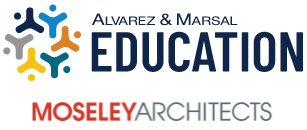
Improving Public School Funding
Improving Public School Funding
Concerned about how the Commonwealth funds public schools?
Worried that NOVA is not getting what is needed to support our kids’ education?
Listen to the Regional Elected Leaders Initiative where we will unpack the 2023 Joint Legislative Audit and Review Commission (JLARC) funding recommendations and the Commonwealth’s FY25 budget proposals/actions with a panel of experts who serve Northern Virginia.

Increasing Quality, Affordable Childcare in NOVA
Increasing Quality, Affordable Childcare in NOVA
There is no greater barrier to increasing workforce participation than lack of childcare. What is Virginia doing to assist NOVA localities? What has our NOVA Ready Region been able to accomplish? Are there any valuable lessons learned from recent pilot programs?

Rail Transportation in NOVA: The Long Bridge
Rail Transportation in NOVA: The Long Bridge
What rail improvements are being constructed in DC, Arlington, Alexandria, Fairfax, Prince William and further south? What is the timeline? What will be the impact on AMTRAK and VRE service and ridership? How can NoVA’s local leaders take advantage of these rail improvements within their localities? What’s going on at Union Station that could affect NoVA?

Transforming a House of Worship to Affordable Housing
The NOVA region is home to a number of faith communities who have transformed their underutilized properties into thriving affordable housing communities. How did they do it? The ins and outs of church processes, government processes and community involvement will be the focus of discussion.
Discussion will address:
- What are the key questions for a faith community to address before initiating any governmental interaction?
- In what ways is a house of worship transformation to affordable housing different from other affordable housing redevelopment?
- What specific questions, barriers, and/or aspects of development, if any, should government explore/research in a different way when a house of worship is requesting a zoning change or affordable housing funding? What should the timing of this consideration be?
- Is the Virginia General Assembly considering any statute or other changes that could impact faith community transformations to affordable housing positively — or negatively.
- What can we learn from communities across the country?
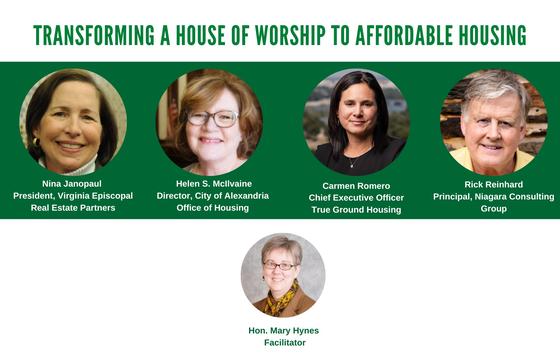
Webinar Sponsors


- Speaker Bios
- Resources:
- Urban Land 09-03-24 “Community Hubs: YIGBY (“Yes in God’s Backyard) Movement Finds New Uses for Declining Houses of Worship”
- Governing 07-05-24 “Can Struggling Houses of Worship Be Turned into Housing? Not Always” (republished in Religion Unplugged, Baptist News Global, and Lake Institute on Faith and Giving Insights)
- Urban Land 02-20-24 “Affordable Housing: YIGBY (‘Yes in God’s Backyard’) Movement Seeks to Counter NIMBY Movement” (republished in Christian Citizen and Leading Ideas)
- Planning 05-05-23 “Transforming Empty Churches into Affordable Housing Takes More Than a Leap of Faith” (with Nadia Mian)
- ‘A win-win’: Using local church buildings to address the affordable-housing crisis
Data Centers in NOVA
Discussion will address:
- How many data centers are in NoVA and how many more are possible?
- What is their impact on the power grid and neighbors?
- How are local governments reacting or planning?
- What is the role of the state and what is the focus of the 2024 JLARC Study?
- How do data centers factor into VA’s adopted energy goals?
- Add speaker photos
- Resources:
- Dominion Energy Load and Load Growth Resource
- AI and National Security
- Washington Post: Data Center Tour in Northern Virginia
- Virginia Mercury: Now What the Heck do we do About Data Centers?
- Virginia Mercury: Data Center Expansion in Virginia, Challenges and Benefits
- Washington Post: Data Center Regulations
- Royal Examiner: Data Center Expansion, With All Its Challenges and Benefits
- The Data Center Capital of the World Is in Virginia
- Mike Turner White Paper: A Strategy for a Changing Paradigm

Pictured above from left to right are the Honorable Rip Sullivan, Virginia House of Delegates; Honorable Mike Turner, Loudon County Board of Supervisors; John Larson, Director of Public Policy and Economic Development, Dominion Energy; Josh Levi,President, Data Center Coalition; and Ivy Main, VA Sierra Club, Renewable Energy Chair.
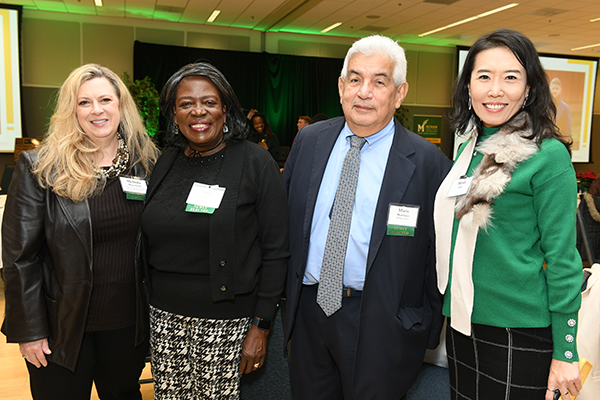
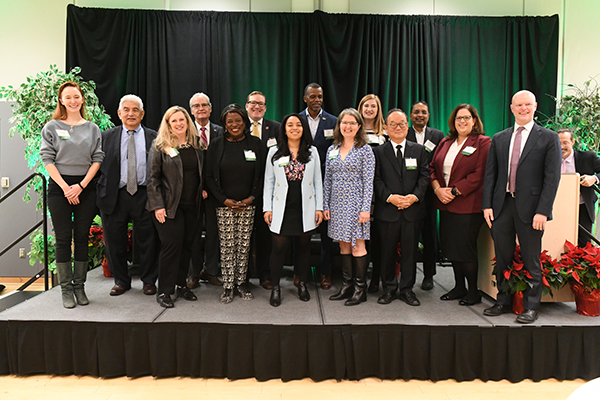
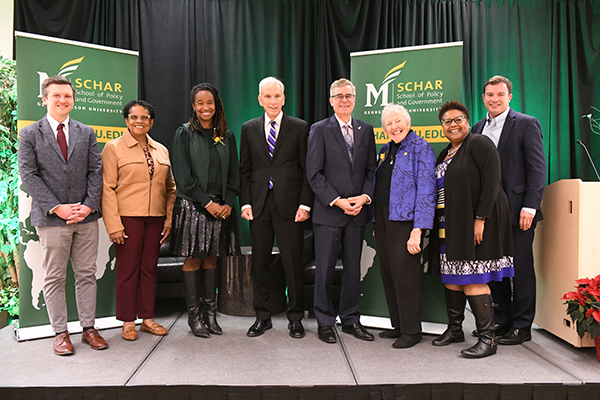
"The Regional Elected Leaders Initiative creates new opportunities for all Northern Virginia elected leaders to work together to meet our biggest challenges."
"As a newly elected local elected official, I learned so much and left with a number of good policy ideas - particularly in the area of affordable housing. I will return."
"I would recommend these seminars to my colleagues. Having time to talk with local elected officials helped me understand their perspective and fine-tune my legislative proposals."
See What We Did in 2023
2023 In-Person Annual Luncheon & Awards: Keynote speaker Dr. Stephen Fuller challenged the DMV's leaders to come together in developing a consensus for revitalizing the region's economy, culminating in a regional Economic Summit in the Spring of 2024. Alex Orfinger, Publisher of the Washington Business Journal, engaged Dr. Fuller in a lively Q & A following his presentation. 2023 awardees were Senator Dick Saslaw, Supervisor Penny Gross and School Board Member Meagan Alderton.
2023 Webinars: Successful webinars were held on collective bargaining, executive evaluation, expanding affordable homeownership, school and government collaboration on climate action, crime trends, and reducing traffic deaths and injuries. A summary of the programs and speakers, as well as the tape of each program are linked below.
May 5, 2023 Best Practices in Executive Evaluation
Speakers:
- Dr. Rob Smith, Professor Emeritus - GMU Education School, former Arlington Public Schools Superintendent
- Dr. Ron Carlee, Professor ODU, former Manager Charlotte NC and Arlington VA
- Hon. Penny Gross, Supervisor, Fairfax County Board of Supervisors
Speaker Bios:
Robert G. Smith
Associate Professor Emeritus
Education Leadership Program
College of Education and Human Development
George Mason University
Email: smith.robert822@gmail.com
Robert G. Smith, a graduate of Davis & Elkins College (B.A., 1965, History & Political Science) and the University of Maryland (M.A., 1972, Government & Politics & Ph.D., 1973, Educational Administration, Curriculum and Supervision), retired on September 1, 2019, as Associate Professor Emeritus from the Education Leadership Program of the College of Education and Human Development of George Mason University (Fairfax, Virginia). Prior to joining the faculty at Mason in 2009, he served for 44 years in a variety of positions in PK-12 education; 16 years as a teacher, building administrator, and in several central office staff positions (1965-1981) in the Frederick County (MD) Public Schools; 16 years as Assistant Superintendent of Curriculum and Instructional Services (1981-1997) in the Spring Independent School District (TX), and 12 years (1997-2009) as Superintendent of the Arlington Public Schools (VA). He is the author or co-author of 18 journal articles, 6 book chapters and 2 books; Striving for Equity: District Leadership for Narrowing Opportunity and Achievement Gaps (2016), and Gaining on the Gap: Changing Hearts, Minds and Practice (2011). Current community and service activities include member of the Davis and Elkins College Board of Trustees, and member of the Board of Directors of the Dream Project (Arlington, VA). Rob and his wife Sandy live in Arlington, VA and are the parents of two daughters and five grandchildren.
Ron Carlee, D.P.A.
Clinical Assistant Professor
School of Public Service, Strome College of Business
Old Dominion University
Email: rcarlee@odu.edu
Ron Carlee is an Assistant Professor (Clinical) at Old Dominion University, where he teaches graduate courses in public administration in the Strome College of Business, School of Public Service. His teaching and research are informed by his previous professional work as the City Manager of Charlotte, North Carolina, County Manager of Arlington, Virginia, Director of Health and Human Services in Arlington, Virginia, and Chief Operating Officer of the International City/County Management Associations (ICMA).
Carlee teaches public budgeting and finance, local government management, human resource management, DEI, and public administration ethics. Before joining ODU full-time, Carlee previously taught as an adjunct in the George Washington University Trachtenberg School of Public Administration and Public Policy for 19 years.
A Fellow in the National Academy of Public Administration, Carlee holds a B.A. from the University of Montevallo, Alabama, an M.A. in Urban Studies from the University of Alabama-Birmingham, and a D.P.A. from George Mason University.
Penny Gross
Member Fairfax County Board of Supervisors
Email: mason@fairfaxcounty.gov
Penny Gross was first elected to the Fairfax County Board of Supervisors, representing the Mason District, in November 1995, and was re-elected to her 7t term on November 5, 2019. Supervisor Gross is vice-chair of the Board, and chairs the Personnel Committee.
Regionally, Supervisor Gross represents Fairfax County on the Board of Directors of the Metropolitan Washington Council of Governments, which she chaired in 2009; the Northern Virginia Regional Commission, which she also chaired; the INOVA Health System Board of Trustees, and the Potomac Watershed Roundtable. In September 2022 she received the Excellence in Governance award from the Virginia Hospital and Health Care Association.
On the state and national level, Supervisor Gross is a past president of the Virginia Association of Counties, vice-chair of the National Association of Counties' Energy, Environment, and Land Use Committee, and past president of the National Association of Regional Councils. Supervisor Gross was first appointed by Governor Mark Warner to the Local Government Advisory Committee (LGAC) to the Chesapeake Executive Council, which she chaired from March 2006 until August 2008, and continues to serve. Prior to her tenure as Supervisor, Ms. Gross worked for 20 years as staff in various congressional offices. She served on the Board of the Lincolnia Park Civic Association (1985 to 1997), and on the Executive Board of the Mason District Council of Civic Associations (1988 to 1995). She has held numerous offices with PTA, and is an Honorary Life Member of the Virginia State PTA.
Supervisor Gross writes a weekly column in the Falls Church News Press, and hosts the monthly television show, Mason Matters, on Channel 16. A founding member of the Friends of Mason District Park, Ms. Gross is also a founding member and officer of the National Capital Chapter of the University of Oregon Alumni Association. She was co-manager of Girl Scout Service Unit 52-4 for nine years. Supervisor Gross and her husband, Hal, reside in the Lincolnia section of Mason District.
Key questions:
- What should be evaluated in an executive evaluation?
- What value is there in the evaluation process for both evaluators and the executive?
- What are key steps and major pitfalls in effective executive evaluation?
- Is there a role for outside parties - human resources personnel, facilitators, executive search professionals?
- How should contract renewals, performance bonuses or pay enhancements interact with the evaluation process?
May 19, 2023 Collective Bargaining
Speakers:
- Sarah Espinoza, J.D., Labor Arbitrator and Mediator; SME Dispute Resolution, LLC
- Cynthia Hudson, Esq., Eppes-Hudson Law, PLLC, former Chief Deputy Attorney General of Virginia
- Justin Keating, Labor Attorney, Partner, Beins, Axelrod & Keating, P.C.
- Lydia Martinez, Esq., Director, Office of Labor Relations, Fairfax County Public Schools
Key Questions:
- What is the status of collective bargaining adoption among NOVA’s local governments and school districts?
- What does success look like for employees, governing boards, governmental organizations? What are the key ingredients to success? The biggest challenges?
- What is the authority and role of elected officials in jurisdictions and school divisions? Professional staff? Bargaining units?
- What are the implications of schools not having taxing authority? Is there value to communications between a county/city & their schools? Any lessons from other states?
- Can collective bargaining affect workplace communication and relationships? If so, how can these impacts be mitigated?
- How might the region organize to learn or collaborate in collective bargaining moving forward?
September 15, 2023 Climate Action: Local Government and School Collaboration
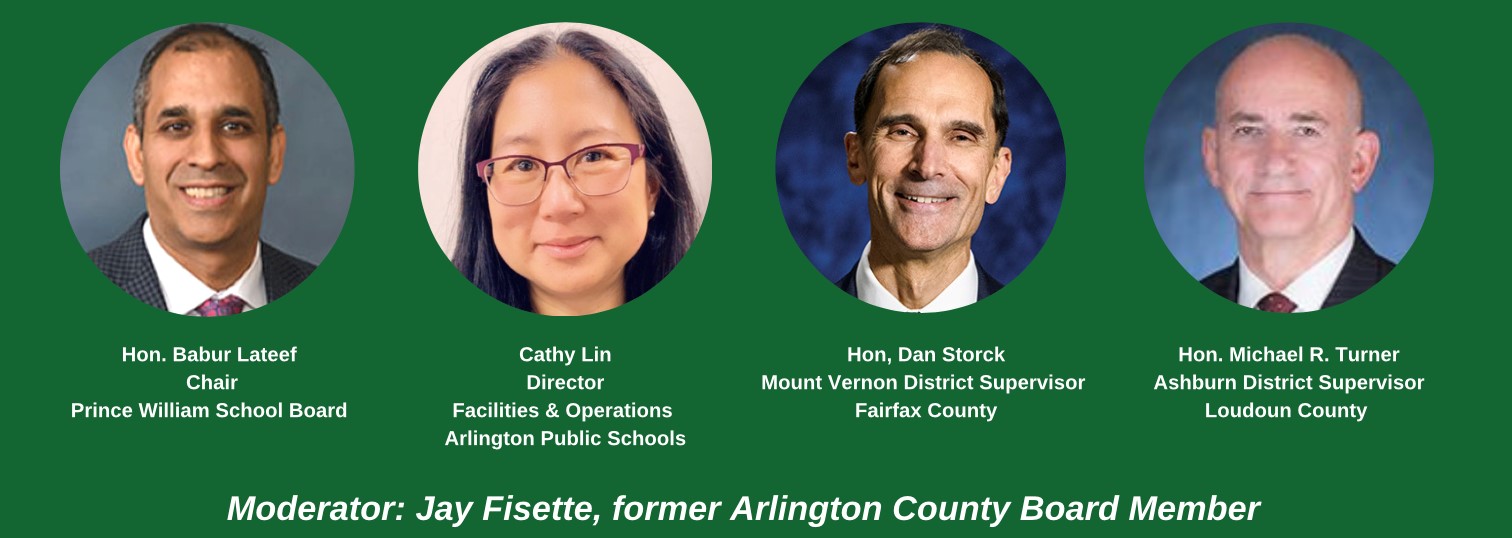
Key questions:
- Is there any value in local governments and their school systems coordinating on climate actions? Integrated plans? Goals? Technical support? Procurement?
- What are some tangible examples of successful collaboration?
- Do elected officials have a role, opportunity or responsibility to advance this collaboration? What about the Manager/Superintendent and staff?
- Does successful collaboration require a “champion?”
- Is it important to set up structures to enhance collaboration, or is ad hoc communication sufficient?
- What opportunities are there in the key areas where government/schools have control: Public buildings? Rooftop solar? Fleets?
- How can you communicate this collaboration to your advantage?
Webinar Resources:
September 29, 2023, Reducing Roadway Deaths and Injuries: Fairfax County’s Playbook
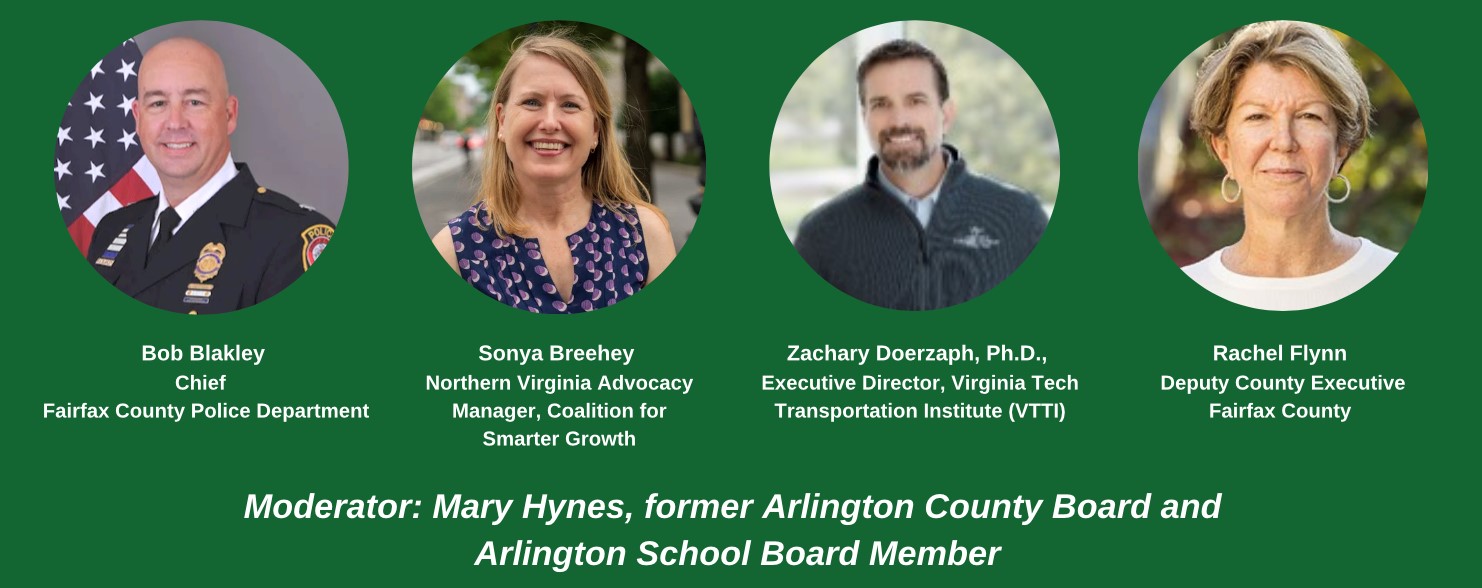
Speaker Bios/Contact information
Key questions:
- How is Fairfax using engineering, education and enforcement strategies to reduce risk to vulnerable roadway users around schools, libraries, parks and other gathering places?
- What happens after a death/serious injury? How is the specific location evaluated? What implications are there for locations with similar characteristics?
- Who chooses which mitigations are most appropriate - short term and long term?
- What’s a typical implementation timeline for each type of mitigation?
- What state and/or local policy changes might make NOVA’s roads safer for all users?
Resources:
- Northern Virginia Families for Safe Streets: Near Miss and Dangerous Locations Survey
- Coalition for Smarter Growth and CASA’s: Bailey's Crossroads Community Walkability Survey and Audit Report
- DMV Intractive Crash Data Tool information reported by police. For the statewide data, two charts are provided from a presentation we already had prepared.
- VDOT Safety Dashboard has all crashes, fatalities and serious injuries reported by district.
- Virginia Pedestrian Safety Action Plan (PSAP)
- VDOT Pedestrian Safety Action Plan (PSAP) Map Viewer
- Virginia Pedestrian Crash Assessment
- VDOT Top Potential Safety Improvement Location Map
- Webinar Slides
- Active Transportation Program | Transportation (fairfaxcounty.gov)
- The ActiveFairfax Plan: Fairfax County Bicycle Master Plan and Trails Plan Update
Mark A. Cole, PE, MPA
State Traffic Operations Engineer
Director, Traffic Operations Division
Virginia Department of Transportation
804-786-4196
Mark.Cole@VDOT.Virginia.gov
October 13, 2023, Expanding Affordable Homeownership in NOVA

Speaker Bios/Contact information
Key questions:
- What’s the state of the ownership market - buyer mortgage costs and earning power, supply of varied housing types?
- What are the barriers to homeownership?
- How are barriers being lowered at the state and local level in our region and elsewhere?
- Who controls access to innovative approaches Virginia could be pursuing?
- What are the best roles and tools for state and/or local government?
Resources:
Virginia Housing Resources
3-D Printed Homes:
- CBS 60 Minutes story
- 3-D printed home partnership between Virginia Tech and Virginia Housing
- 3-D printed home in Richmond – finished product
Modular Housing:
Manufactured/Modular- Cross Mod
DHCD Acquire Renovate Sell Program
Repurposing structures – Prices Fork Village
Governor’s Housing Conference 2023
Shared Equity
October 27, 2023, NOVA Crime Trends: Response to Mental Health Issues
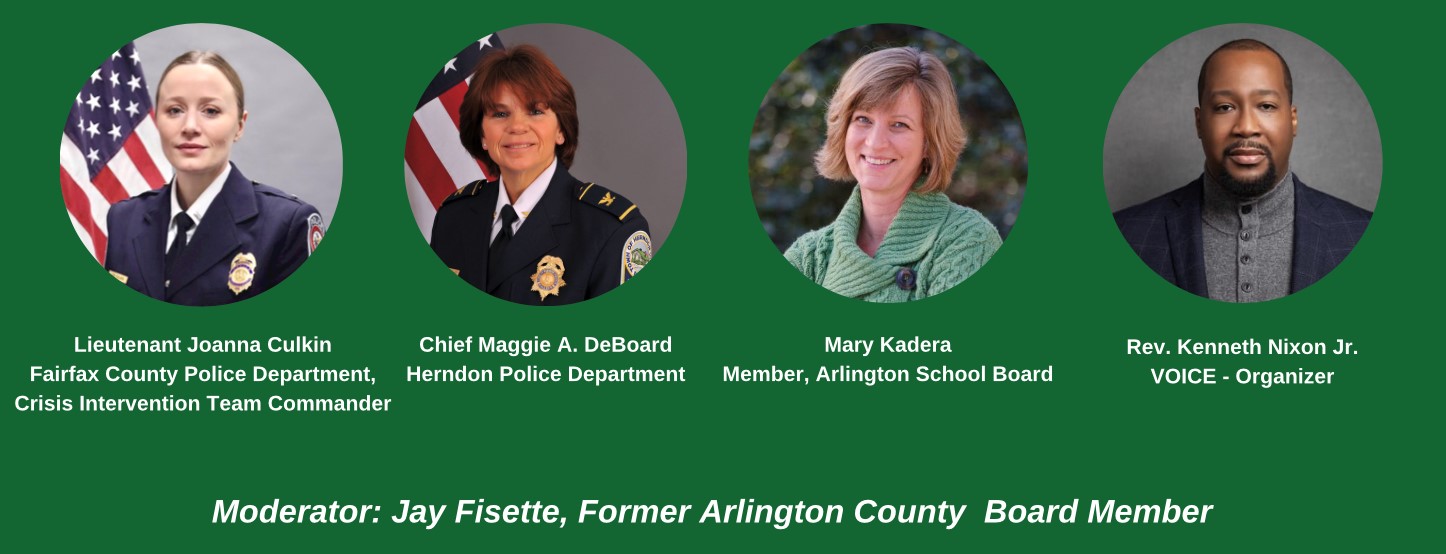
Key Questions:
- What are the actual crime statistics and trends in NOVA? in schools?
- How much of this crime is caused or connected to mental health and substance abuse problems?
- What have local governments done to respond? Non-profit providers? Schools?
- What collaboration across borders and sectors occurs to address these crimes and treat those perpetrating them?
- How have schools been responding to increased drug activity and overdoses?
- What legislative actions have been taken that have helped or hurt law enforcement’s ability to respond? What legislation might be considered?
Resources:
- Crisis Now
- Podcast: Enhancing public safety through regional collaboration
- “COG report shows property crime driving overall crime increase regionwide,” press release, 10/11/23.
- NOVA Crime Data, per locality, thru Aug 2023. Provided by Virginia State Police.
- Youth Mental Health, Substance Abuse and Safety Statistics, Virginia/Arlington
December 8, 2023, Annual Regional Leadership Awards Luncheon
Leaders from our region's public, private and non-profit sectors joined together at the Schar School of Policy and Government’s Regional Elected Leaders Initiative (RELI) Annual Regional Leadership Awards Luncheon. Dr. Stephen Fuller, George Mason University professor emeritus and past director of the Center for Regional Analysis, provided a stark picture of the region’s economy and a call for regional leadership moving forward. We also honored Fairfax County Supervisor, Penny Gross, Alexandria City School Board Member, Meagan Alderton, and Senator Dick Saslaw as the 2023 RELI Leadership Honorees. Watch their remarks and the Keynote address from Dr. Fuller below.
See What We Did in 2022
2022 In-Person Annual Dinner & Awards: Attendees heard an excellent program with Dean Mark Rozell interviewing former Lt. Governor Bill Bolling and former Virginia Secretary of Education Jim Dyke, who stepped in for Congressman Don Beyer at the last minute. 2022 awardees were Delegate Ken Plum, Alexandria Mayor Justin Wilson and Fairfax School Board Member Karen Corbett Sanders. A special regional recognition was presented to retiring MWCOG CEO Chuck Bean.
2022 Webinars: Successful webinars were held on managing disruptive meetings, building acceptance of affordable housing, fleet decarbonization, and reducing traffic deaths and injuries. A summary of the programs and speakers, as well as the tape of each program are linked below.
Effectively Managing Council/Board Meetings: Handling Contentious Issues and Potential Disruptions, May 6 and 20, 2022
GMU’s Regional Elected Leaders Initiative
Overview of Spring 2022 Governance Webinars
Co-sponsored by the VML and VACO
Friday, May 6: Noon –1:15 pm
Webinar #1: NOVA
Effectively Managing Council/Board Meetings: Handling Contentious Issues and Potential Disruptions
Speakers:
Hon. Babur Lateef, Chair, Prince William School Board
Hon. Phyllis Randall, Chair, Loudoun County Board of Supervisors
Hon. David Tarter, Mayor, City of Falls Church
Roger Wiley Esq., Legal Counsel, Virginia Municipal League
Key questions:
- How have political polarization and citizen activism appeared in Council/Board rooms?
- What strategies have others used to effectively manage their meetings?
- Is Roberts Rules or Order an obstacle to managing disruptions or a useful tool?
- What are the powers of the presiding officer?
- What are your options in setting the rules for public comment?
- Are there Codes of Conduct or agreements that help member-to-member dynamics stay civil?
- What role do professional staff play when meetings are contentious?
Friday, May 20: Noon –1:15 pm
Webinar #2: ALL OF VIRGINIA
Effectively Managing Council/Board Meetings: Handling Contentious Issues and Potential Disruptions
Speakers:
Hon. D. Michael Barber, Mayor, Town of Christiansburg
Dr. James Coleman, Chair, Lynchburg City School Board
Hon. Katie Cristol, Chair, Arlington County Board
Walter Erwin, Esq., Former Attorney, City of Lynchburg
Key Questions: same as above.
Video of May 6th Webinar
Video of May 20th Webinar
Resource links
Building Neighborhood Acceptance of New Affordable Housing: Busting the Myths, September 23, 2022
Regional Elected Leaders Initiative
Initiative Sponsor: JBGSmith
Building Neighborhood Acceptance of New Affordable Housing: Busting the Myths
Webinar Sponsor: VaHousing
Key Questions:
- What tools and messaging are being used in NOVA to build support for affordable housing?
- How are localities addressing neighborhood concerns like height, density, parking, traffic, stormwater, and tree canopy?
- How does affordable housing impact students and schools?
- Does affordable housing impact neighborhood property values and livability? What does the research say?
Panelists
Dr. Daniel Domenech, ED, AASA-The School Superintendents Association
Michelle Krocker, ED, Northern Virginia Affordable Housing Alliance (NVAHA)
Erika Moore, Communications and Public Engagement Manager, Arlington County Government
Christina Stacy, Principal Research Associate, Urban Institute
Moderated by Mary Hynes, coordinator, Regional Elected Leaders Initiative, Schar School
Resource List
COG’s 2019 work on housing goals and targets
Community Foundation for Loudoun and northern Fauquier Counties program for workforce housing
Mary Hynes’ recommended resource on change management
Tina Stacy’s 2022 property values impact research
National Housing Conference database of affordability
Arlington Community Foundation Infographic/Data on salaries for essential workers in Arlington who make 30% AMI or less coupled with MIT living wage information for Arlington. View the document on Issuu.
Erika Moore’s recommended tool for creating your own infographics
Fleet Decarbonization: What’s Happening Across NOVA Counties, Cities and Schools, October 7, 2022
Regional Elected Leaders Initiative
Initiative Sponsor: JBGSmith
Fleet Decarbonization: What’s Happening Across NOVA Counties, Cities and Schools
Webinar Sponsor: Dominion Energy
Key Questions:
- What goals and plans are in place? What is the role of local elected officials?
- What are the lessons learned re: charging infrastructure, range/reliability of EVs, maintenance, cost?
- What are the greatest obstacles to fleet electrification?
- What is Dominion doing, or what could they do, to assist?
- Are hydrogen fuels cells a viable alternative to electrification?
- Are there opportunities for regional collaboration to advance fleet decarbonization?
- What are the funding opportunities: Fed? State? NVTA?
Panelists
Josh Baker - General Manager/CEO, DASH - Alexandria Transit Company
Jennifer DeBruhl - Director, Virginia Department of Rail and Public Transit
Francine Furby - Director of Transportation, Fairfax County Public Schools
Dennis Leach - Director of Transportation, Arlington County
Moderated by Jay Fisette, coordinator, Regional Elected Leaders Initiative, Schar School
Resource List:
To assist with planning and implementation of charging infrastructure Contact: electrification@dominionenergy.com
To assess whether hydrogen fuel cells might be an option for fleets, contacts at Washington Gas:
- Natalia Norko, Director Commercial Partnerships, Natalia.norko@washgas.com
- Emanuel Wagner, Lead Strategy & Business Development, Emanual.wagner@washgas.com
What the Inflation Reduction Act will — and not do — for sustainable transportation
- Last month, Congress passed the Inflation Reduction Act, the nation’s first major investment in climate change mitigation. The law is expected to reduce the country’s greenhouse gas emissions by channeling funding through tax credits, loans, and grants—taking a major step to position the administration to meet its goal of reducing U.S. emissions by 50 percent by 2030 and fulfill Paris Agreement guidelines
The second conference on ‘Clean Buses in the US’, which will be held on November 9-10 at InterContinental San Francisco. LA Metro, SFMTA, AC Transit, CapMetro, OCTA, Napa VTA, SunLine Transit Agency, Utah Transit Authority, US DoE and many more have confirmed to speak.
- Unofficial Summary of NOVA Electric Busses - from Sierra Club
- NOVA electric transit buses:
- City of Alexandria (DASH) has 14 in service, funding for 12 more through 202
- Arlington County (ART) has none
- Falls Church N/A
- Fairfax County (Connector) has 8 on order expected in December
- Loudoun County (Loudoun County Transit) has none
- NOVA electric school buses:
- City of Alexandria 15 (at least five are in service, grant for 10 awarded earlier this year)
- Arlington County has none
- Falls Church 2
- Fairfax County 18 (at least 8 are in service, grant for 10 awarded earlier this year)
- Loudoun County 21 (at least 5 are in service, grant for 6 more awarded last year, grant for 10 awarded earlier this year)
- NOVA electric transit buses:
Loudoun applied for a grant for 25 more from the EPA.
- Electric School Buses (ESB) in Virginia. Summary from Virginia Clean Cities
- Info on DRVE Tool from the Electrification Coalition:
MWCOG RESOLUTION ENDORSING EFFORTS TO SUPPORT ELECTRIC VEHICLE DEPLOYMENT
Contact at Highland Electric, which has a turnkey contract to transition the Montgomery County Schools bus fleet to 100% electric
- Claire Alford, Associate, Market Development, 832.797.1460, claire@highlandfleets.com
Northern Virginia Transportation Commission 1 Agenda Item #3 – June 2022 Meeting Materials
- Contact: Kate Mattice, katemattice@novatransit.org
Northern Virginia Zero-Emission Bus (ZEB) Strategic Plan:
- The purpose of this effort is to assist Northern Virginia transit providers in implementing zero-emission buses (ZEBs), associated technology and infrastructure. The goals of the Strategic Plan are to:
- Identify regional zero-emission strategic goals and objectives with a focus on realizing economies of scale, utilizing individual agency goals and plans and stakeholder input;
- Document strategies and priorities to achieve those zero-emission strategic goals and objectives, including how to implement ZEBs to align with regional and agency goals;
- Identify methods for NVTC to best coordinate its activities with regional partners to achieve the plan's strategic goals and objectives; and
- Detail methods and processes to utilize programs and partnerships, as well as local, state and federal funding to accomplish the goals laid out in the strategic plan and identify emerging opportunities or challenges for additional activities or investments. The process will include an implementation study with deployment guidance specific to each regional partner, including regionally aligned agency transition planning and coordination for Northern Virginia transit agencies.
Clean, efficient and sustainable transportation technologies are critical to Northern Virginia’s transit future. Regional coordination and investing in equitable, compatible infrastructure are key elements of ZEB planning. Realizing regional and agency goals requires careful preparation and a feasible long-term deployment strategy. Technical support and advanced tools are required for making planning and procurement decisions both at the regional and individual transit agency level. NVTC partner agencies have all expressed interest in ZEB deployment, and several have initiated ZEB planning studies, procurements or pilots. By employing strategic analysis at the regional level, transit agencies can achieve economies of scale and realize the benefits of ZEBs.
This effort is funded through an FY 2023 DRPT Technical Assistance grant for $480,000. This includes state assistance of 50% ($240,000) and local match of 50% ($240,000).
Arlington Transportation Projects
Fairfax County Public Schools Information on Electric School Buses
Reducing Traffic Deaths and Injuries: Best Practices, October 21, 2022
Regional Elected Leaders Initiative
Initiative Sponsor: JBGSmith
Reducing Traffic Deaths and Injuries: Best Practices
Key Questions:
- What goals and plans are in place?
- How do Vision Zero, Safe Streets For All, and Safe Routes to Schools programs interact with these goals?
- What are the top 2 tangible actions localities can take to reach their goals?
- What are the most innovative actions taken or being planned in localities? In states?
- Are there best practices to protect kids? The elderly?
- What are the greatest obstacles? Leadership? Funding?
- Do you see opportunities for regional collaboration to advance these goals?
Panelists
Christine Baker, AICP, Principal Planner and Vision Zero Program coordinator, Arlington County
Tom Biesiadny, Director of Transportation, Fairfax County
Jerry Roche, Team Leader, Safety Integration, Office of Safety - Federal Highway Administration
Dave Snyder, Council Member, City of Falls Church and Vice-Chair, NVTA
Nick Donohue, Panel Moderator, Principal, Capitol Transportation Consulting and Former VDOT Deputy Secretary
Resource List:
Vulnerable Road User Safety Assessment Guidance
Three Approaches to Address Severe Roadway Crashes
The Street Project PBS Special
Metropolitan Washington Council of Governments Roadway Safety
See What We Did in 2021
2021 In-Person Annual Dinner & Awards: Attendees heard an excellent program with Dean Mark Rozell interviewing former Secretary of Education Anne Holton and former Secretary of Transportation and Secretary of Finance Aubrey Lane. 2021 awardees were Senator Janet Howell, Council Member David Snyder, and School Board Chairs Barbara Kanninen and Babur Lateef.
2021 Policy Webinars: Successful policy webinars were held on Housing, Police Reforms, Transportation, Marijuana Laws and Equity in Budgeting. A summary of the programs and speakers, as well as the tape of each program are linked below.
Housing: Strategies for localities that address historic housing segregation patterns in Virginia, September 17, 2021
Police Reform: Qualified Immunity, Citizen Review Boards and School Resource Officers, October 1, 2021
Transportation: New approaches to Street Design that help Businesses Thrive, October 15, 2021
Marijuana Laws: What Happened and What Local Governments Need to Know, Friday, October 29, 2021
Budgeting with an Equity Lens: The Washington Area Boards of Education (WABE) Annual Report and Beyond, Friday, November 12, 2021
See What We Did in 2020
2020 Policy Webinars: Successful policy seminars were held on Transportation, Housing, Economic Development and Climate Action. A summary of the programs and speakers is attached.
2020 Program’s Virtual Awards Dinner: Attendees heard a lively program with Dean Mark Rozell interviewing Senate Majority Leader Dick Saslaw and House Majority Leader Charniele Herring. Regional Leadership awards were presented to Delegate Vivian Watts and Loudoun County Supervisor Matt Letourneau.
